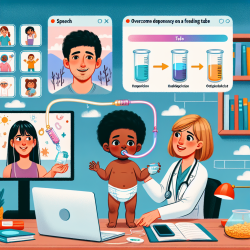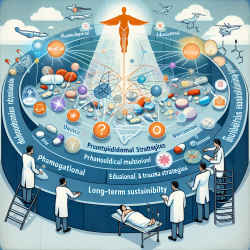Communication is a fundamental human need, and for individuals with Alzheimer's disease, maintaining the ability to communicate effectively can significantly impact their quality of life. The research article "Maintaining Satisfactory Communication with People Suffering from Alzheimer's Disease: Creation of Videos for Caregivers" by Angers, Sylvain, and Macoir (2021) offers valuable insights into supporting communication for those with Alzheimer's. This blog post will delve into the key findings of the research and provide actionable strategies for practitioners to enhance their skills in this critical area.
Understanding the Communication Challenges in Alzheimer's Disease
Alzheimer's disease is characterized by progressive cognitive decline, which includes difficulties in communication. These challenges manifest in various ways:
- Difficulty finding words (anomia)
- Problems understanding language
- Challenges in participating in conversations
These issues not only affect the individuals with Alzheimer's but also pose significant challenges for their caregivers.
Key Findings from the Research
The study by Angers et al. (2021) emphasizes the importance of equipping caregivers with effective communication strategies. The researchers developed a series of four short videos aimed at providing practical guidance to caregivers. The videos cover:
- General information about Alzheimer's disease and its impact on communication
- Specific communication difficulties and strategies to address them
These resources were designed to be accessible and easy to understand, making them valuable tools for caregivers.
Implementing Research-Based Strategies
As a practitioner, you can integrate the following strategies into your practice to support communication for individuals with Alzheimer's:
- Allow Time: Give the individual ample time to express themselves. Avoid rushing them, as this can increase frustration.
- Encourage Alternative Communication: Suggest using synonyms, definitions, or gestures when they struggle to find the right words.
- Clarify and Simplify: Use short, simple sentences and clarify the topic of conversation to enhance understanding.
- Reduce Distractions: Minimize environmental distractions to help the individual focus on the conversation.
- Use Visual Aids: Incorporate gestures and objects from the environment to support comprehension.
Encouraging Further Research and Professional Development
Continued education and research are vital for improving outcomes for individuals with Alzheimer's. Practitioners are encouraged to:
- Stay updated with the latest research in speech-language pathology and neurodegenerative diseases.
- Participate in professional development opportunities, such as workshops and webinars.
- Collaborate with other healthcare professionals to share knowledge and strategies.
Conclusion
By implementing the strategies highlighted in the research by Angers et al. (2021), practitioners can significantly enhance communication for individuals with Alzheimer's disease. These efforts can improve the quality of life for both the individuals and their caregivers.To read the original research paper, please follow this link:
Maintaining Satisfactory Communication with People Suffering from Alzheimer's Disease: Creation of Videos for Caregivers.










